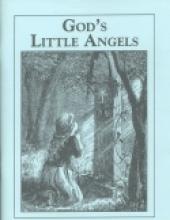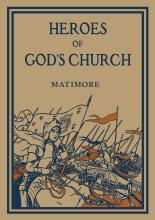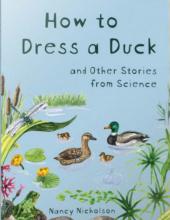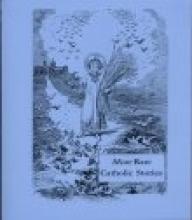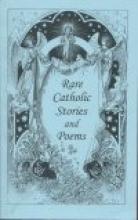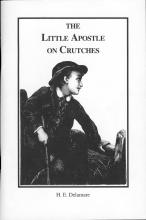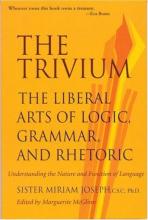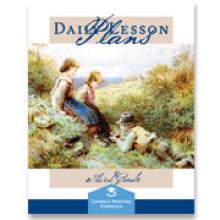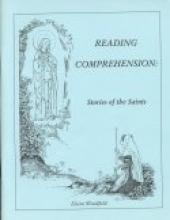Language Arts Reading Comprehension
God's Little Angels
This lovely story is reprint of the 1905 book The Transplanting of Tessie. Little Tessie spent six years at a convent boarding school before becoming ill. She finds herself at her uncle's country estate where she recovers and, through many adventures, brings her relatives to the Catholic faith. All of our children enjoyed this touching story. The author writes vividly and with just enough suspense to keep the reader wanting more. Each chapter is followed by a set of comprehension questions (answers at the back of the book) for those who want to use the book as part of their schoolwork. Although I read this story aloud to our children it is also suitable for mature 5th graders and older to read alone. Younger children will enjoy hearing the story and will benefit from having some of the older customs mentioned in the book explained to them. The softcover on this 8 ½" x 11" book is easily torn so owners may want to cover it with clear contact paper before passing it on to their children to read.
Copyrights 1905/1998
Heroes of God's Church
"In writing this volume, the purpose has been to acquaint our children with biographies that will have some particular influence on the development of their characters. Each story has been planned as a real character-training project, not merely as a reading lesson to inspire admiration for faith and religious heroism." (From the Foreword)
I think the author does an admirable job in achieving his purpose. We are shown how the Saints were real people who struggled with things like bad tempers and parents who just didn't understand their religious fervor. Some became great saints by just doing the little everyday things well and out of love while others showed incredible heroism through the most agonizing tortures and martyrdom.
The book covers 25 Saint stories, from 6 to 18 pages each, with comprehension questions for each story. We are presented with a variety of Saints of every age with a true diversity of personalities, difficulties to overcome and social classes. The chronological order and selection would also make this a very worthwhile supplement to a study of World History.
The comprehension questions seem suited to mid-grade school (perhaps grades 3-6) but the stories themselves would be appropriate for a wide age range (probably from first grade through adult if care is taken with regard to some of the "scarier" martyr stories for the very young ones).
I would like to note that there is an incident related in the story of St. Patrick that I think might be disturbing to children and I suspect that it's either a legend or there are parts of the story missing. I recommend that parents read that one story ahead of time in order to decide how to handle it with their own children.
How to Dress a Duck and Other Stories from Science
This book offers thirty-six stories about God's amazing world that very nicely brings science back to its creator and helps children make connections between faith and reason. We've had the earlier edition of this book for a number of years and I have found many tidbits about nature that were new and very interesting to me - especially information about why God made things the way that he did and what is good and useful about his creation.
This new edition includes many new stories and looks more like a grade school workbook - in size and appearance as well as having space for the students to answer the chapter questions right in the book. In addition to the Catholic content I really like this book because 1. it is loaded with interesting content, 2. it is written in an appealing story-like format, 3. it is not "dumbed-down" or written in a condescending tone like so many textbooks. Here's a brief excerpt to give you a sense of the style and content:
"God has a similar system for supplying water to places that don't get much rain in the summer. Instead of a freezer, God uses tall, snow-covered mountains to store up icy snow. In some mountain ranges, like the Rocky Mountains that stretch north and south across Canada and the United States, peaks often receive thirty or forty feet of snow each year. That is nearly enough snow to bury a Ferris wheel! Even after winter has passed, the cool mountain air allows the snow to melt very slowly. Melting snow slips into creeks and rivers that carry needed water to farms and cities far away. Some of those farms and cities don't get much rain in the summer. Some of them don't even have snow in the winter. But the people who live there are happy to drink and swim in the water that came from God's faraway frozen mountains." (from "Merciful Rain" pgs. 59-61)
This book can be used as a science supplement or as a non-fiction reading comprehension workbook.
More Rare Catholic Stories and Poems
This second volume of stories is very similar to the first. Volume 2 is a larger book (7" x 8") and geared for slightly older children.
Rare Catholic Stories and Poems
Make sure you have a hankie close by when you read these books. These faith inspiring stories surely must have contributed to the steadfastness that Catholic children displayed years ago. The stories in both volumes include main characters that are young and old, male and female thus appealing to everyone. Each story is short enough to be read by an average 4th grader in five to ten minutes. Follow up comprehension questions range from simple recall to more the more thought provoking type that would open the door to many wonderful parent child discussions. We had our children read this book straight through as their spiritual reading and at a later time had them read some of the stories again and work through the comprehension questions. This book would also serve well as a source for bedtime stories or for poetry memorization. Volume 1, which is suitable for grade 3 and up, is a small softcover book 5½" x 8½" and includes several illustrations for each story.
The Little Apostle on Crutches
The Little Apostle on Crutches by H. E. Delamare is the story of young Willie– almost nine–whose cheerful goodness touches the lives of everyone he meets.
Through his many adventures, he always strives to do what is right, making him an excellent role model for younger children. For example, he faces persecution from another boy who covets his newspaper corner. Yet, he treats the other boy with continual kindness.
Willie is unique in that he is not afraid to share his faith. When asked about the family's financial difficulties, he replies..."'We're Catholics and that helps one so much, doesn't it? It keeps one contented and happy–and teaches one to bear one's troubles.'"
Because the book was originally published in 1911, there is a quaint old-fashioned flavor to some of the language. However, this never interferes with the meaning of the story. For example, as a complement, another boy says of Willie, "'You're a bully little chap, anyhow!'"
A short 86 pages long, The Little Apostle on Crutches is republished by Catholic Heritage Curricula. Although the story would be a great a read aloud for any age, the reading level is 3-6 grade. This paperback has no illustrations, but you do not miss them.
Update from webmaster, March 2024: It appears that CHC is no longer printing this book. However, you can click here for the Internet Library copy of The Little Apostle on Crutches or find it from a variety of sources who reprint public domain works.
The Trivium: the Liberal Arts of Logic, Grammar, and Rhetoric
This little gem was used as a freshman college course after the author met philosopher Mortimer Adler and understood the importance of teaching basic language skills as the foundation of other learning. After some years of study, she put together this course in the Trivium, the three language arts – of word relations (grammar), concept relations (logic), and composition (rhetoric). The result is a primer in Aristotle's Categories, a demanding course in logic, and a prerequisite to good composition. It is not, mind you, a course in grammar conceived as the study of commas, periods, and subjunctive verbs, though it might lead to insight into these matters. Not is it a course in "symbolic logic", the modern logic stripped of thought and studied simply as a form of mathematics. Rather, Sister Miriam offers a prerequisite to philosophy and writing, for this is a course in clear thought and the right use of language.
With all this, The Trivium is demanding, yet it is very accessible. Despite its original use as a freshman college course, it reminded me very strongly of my high school logic text, which, like this, was the work of an obscure nun who had studied Aristotle and wanted his clarity to form the minds entrusted to her care. I look forward to the opportunity to use it at the high school level.
Not only is the volume accessible, but one must delight in its literacy. The illustrations are taken from the great literature of western culture – so the mind is always lifted. It is a pleasure to read, and study is always rewarding, because every step sparkles with beauty and interest as well as clarity. Many of Sister Miriam's examples were originally taken from great literature; her loving editor Marguerite McGlinn has taken the liberty of replacing those illustrations which were time-bound with even more good literature so as to move the book into its rightful place as a timeless resource.
For those who know and love Dorothy Sayers' little essay on the trivium, it may be appropriate to warn that this is not in any sense a resource for primary or middle school children.
Catholic Heritage Curricula Lesson Plans: Third Grade - Supplements
The supplements are carefully woven into the third grade lesson assignments, but for those who prefer not to use the lesson plans the supplements alone could easily be used for enrichment and would make purchasing the plans worthwhile. For example the book report supplements contain clear guidelines for helping young students write book reports, a checklist to help the student in their efforts, creative ideas for written reports or oral reports and hands-on project reporting. There are over 20 beautifully illustrated forms to be used for writing the reports or keeping track of books that have been read. These are not the normal squares and circle forms on the market, but are ruled pages containing illustrated borders depicting Victorian, Catholic and nature scene which would appeal to the eyes of both children and adults. Book report books comparable in length sell for about $6.99.
In addition to the book report supplement, the plans include a series of reading comprehension pages. Once again the pages are visually attractive to the student and they focus on questions designed to encourage beginning literary analysis as well as the usual comprehension type questions. These pages are based on three outstanding books: Catholic Tales for Boys and Girls, More Catholic Tales for Boys and Girls, The Little Apostle on Crutches. Almost 50 pages in length, this supplement is comparable to workbooks that sell for about $8.99 with the added feature that they are Catholic and clever in their design.
"At the Feet of Mary: Holy Rosary Project." is the most beautiful introduction to the rosary that I have seen. It is designed as a hands-on project to bring the faith to life. Each week the child focuses on a different mystery through discussion, readings from a lovely description of a child's trip to shrines, the coloring of gorgeous illustrations that form part of a prayer book and meditations that are clearly explained. The prayer book that the child makes includes illustrations that will touch the heart of a child because they depict the Mysteries as seen through the eyes of a child. At the end of this 5 week project the child has produced a gorgeous prayer book. This supplement is 65 pages long and nothing on the market even remotely compares to the depth and beauty found in this project, but books on meditating, understanding the rosary and illustrations on the rosary combined would stand at about $15.95.
The fourth supplement focuses on geography and is entitled "Tour a Country." It includes both a general plan for the study of any country, as well as nine sets of four week plans for studying specific countries. (i.e., 36 week course covering nine specific countries.) The instructions are easy to follow and have a Catholic world view. The pages themselves are beautifully illustrated and the activity pages are sure to please the children. We have been using a "Countries of the World" activity book that cost $15.99, but will be switching to the "Tour a Country" supplement as the activities are more interesting and the study approach is more focused and logical as well as Catholic.
Finally, there are: monthly planners and certificates which could be used for any grade or program; thirty pages devoted to the teaching of third grade which answers home schooling questions as well as teaching independence; a dozen pages of memory gems and how to use them; illustrated chore and virtue charts Similar books covering home schooling helps, charts and poetry together would cost at least $12.99 If one were to buy books that covered the material contained in each of the four supplements the cost would be over $50.00 but the books wouldn't be Catholic in approach or presented in a way that allows the home school mother to efficiently teach the subject. For the family that home schools using material other then those published by CHC it is clear that the supplements alone make the plans well worth the price. You won't be disappointed. (365 pages of lesson plans and supplements cost $38.95 from CHC)
Reading Comprehension: Stories of the Saints, Volume 1
Ten Saint stories are told in an engaging manner for children (recommended for mid-grade schoolers): St. Maria Goretti, St. Maximilian Kolbe, St. Catherine Laboure, St. Bernadette Soubirous, Blessed Miguel Pro, St. Martin De Porres, St. John Bosco, St. Francesca Cabrini, St. Philomena, and Blessed Herman of Reichenau. Each story is approximately 6 - 8 pages long and is illustrated with pen and ink drawings. The Reading Comprehension portion for each story includes vocabulary words, study questions and a number of projects relating to the saint such as - memorizing special quotes from the saint, researching a report relating to the saint, illustrating scenes from the story or studying some of the geography of where the saint lived and worked. The stories are beautiful and inspiring and cover both very familiar saints and some more obscure ones. My very favorite (whom I had never heard of before) was Blessed Herman of Reichenau - a severely crippled monk (with a brilliant mind) who lived in the Middle Ages and composed the Salve Regina (Hail Holy Queen).
A complete answer key is found in the back of the book.

